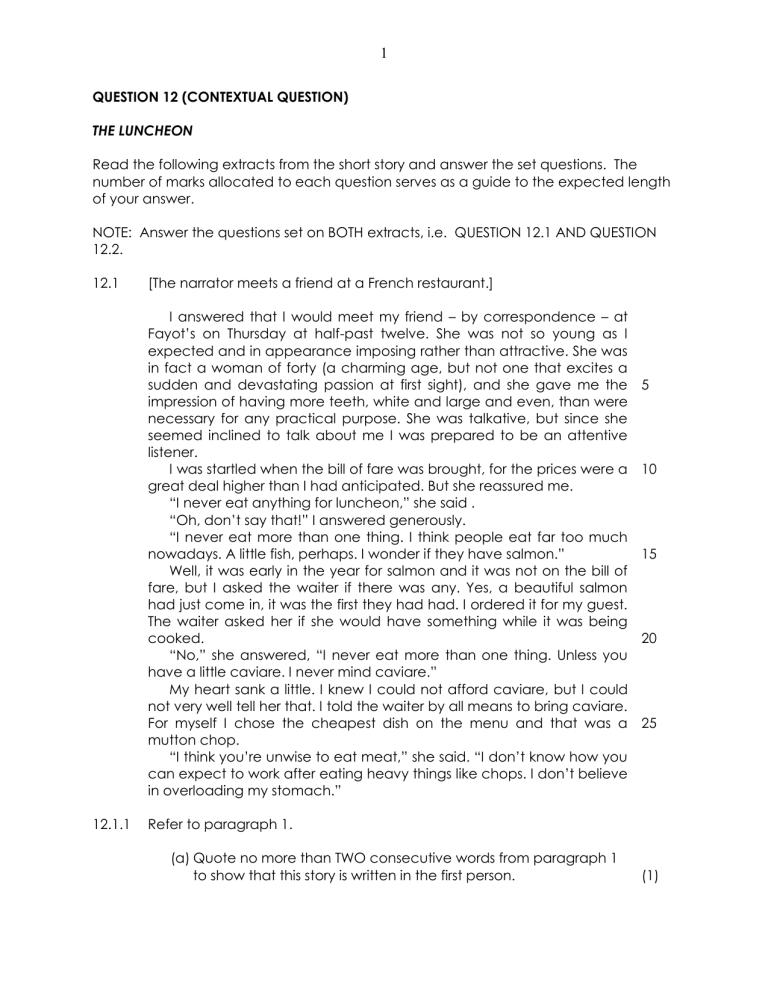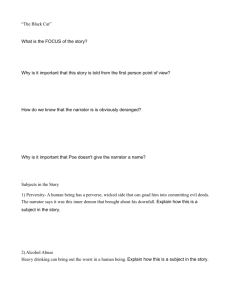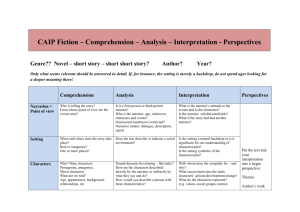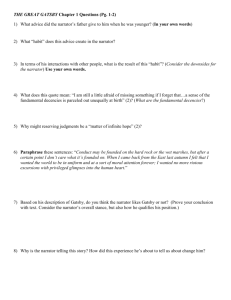Question-12-The-Luncheon-Contextual.doc

1
QUESTION 12 (CONTEXTUAL QUESTION)
THE LUNCHEON
Read the following extracts from the short story and answer the set questions. The number of marks allocated to each question serves as a guide to the expected length of your answer.
NOTE: Answer the questions set on BOTH extracts, i.e. QUESTION 12.1 AND QUESTION
12.2.
12.1 [The narrator meets a friend at a French restaurant.]
I answered that I would meet my friend – by correspondence – at
Fayot’s on Thursday at half-past twelve. She was not so young as I expected and in appearance imposing rather than attractive. She was in fact a woman of forty (a charming age, but not one that excites a sudden and devastating passion at first sight), and she gave me the impression of having more teeth, white and large and even, than were necessary for any practical purpose. She was talkative, but since she seemed inclined to talk about me I was prepared to be an attentive listener.
I was startled when the bill of fare was brought, for the prices were a
5 great deal higher than I had anticipated. But she reassured me.
“I never eat anything for luncheon,” she said .
“Oh, don’t say that!” I answered generously.
“I never eat more than one thing. I think people eat far too much nowadays. A little fish, perhaps. I wonder if they have salmon.”
Well, it was early in the year for salmon and it was not on the bill of fare, but I asked the waiter if there was any. Yes, a beautiful salmon had just come in, it was the first they had had. I ordered it for my guest.
10
The waiter asked her if she would have something while it was being cooked.
“No,” she answered, “I never eat more than one thing. Unless you have a little caviare. I never mind caviare.”
My heart sank a little. I knew I could not afford caviare, but I could not very well tell her that. I told the waiter by all means to bring caviare.
For myself I chose the cheapest dish on the menu and that was a mutton chop.
“I think you’re unwise to eat meat,” she said. “I don’t know how you
20
15
25 can expect to work after eating heavy things like chops. I don’t believe in overloading my stomach.”
12.1.1 Refer to paragraph 1.
(a) Quote no more than TWO consecutive words from paragraph 1 to show that this story is written in the first person. (1)
2
(b) Quote no more than FOUR consecutive words from the extract to show that the narrator has never met the woman in person before.
(c) Using your own words, briefly describe the narrator’s emotions when he first meets the woman. State TWO points.
12.1.2 Refer to lines 10 – 11: (‘I was startled … she reassured me.’)
(d) In your view, why does he feel this way? State TWO points.
What do you think the woman reassured the narrator about?
12.1.3 Refer to line 12: (‘I never eat anything for luncheon’).
Explain the irony in this line.
12.1.4 From your knowledge of the story as a whole, discuss the woman’s character.
12.1.5 Refer to lines 23 – 24: (‘My heart sank … to bring caviar.’)
(a) What does the use of the word ‘sank’ suggest about the narrator’s feelings?
(b) Is the following statement TRUE or FALSE? Give a reason to support your answer.
The narrator is not pleased with the woman’s actions, but doesn’t want to offend her.
12.1.6 Refer to line 27: (‘I think you’re unwise to eat meat’).
Do you agree with the woman’s statement that the narrator is ‘unwise to eat meat’? Give a reason to support your answer.
AND
(2)
(2)
(3)
(1)
(2)
(2)
(2)
(1)
(2)
3
12.2 [The narrator is concerned that he will not be able to pay the bill.]
The asparagus appeared. They were enormous, succulent and appetizing. The smell of the melted butter tickled my nostrils as the nostrils of Jehovah were tickled by the burned offerings of the virtuous
Semites. I watched the abandoned woman thrust them down her throat in large voluptuous mouthfuls and in my polite way I discoursed on the condition of the drama in the Balkans. At last she finished.
“Coffee?” I said.
“Yes, just an ice-cream and coffee,” she answered.
I was past caring now, so I ordered coffee for myself and an icecream and coffee for her.
“You know, there’s one thing I thoroughly believe in,” she said, as she ate the ice-cream. “One should always get up from a meal feeling one could eat a little more.”
“Are you still hungry?” I asked faintly.
“Oh, no, I’m not hungry; you see, I don’t eat luncheon. I have a cup of coffee in the morning and then dinner, but I never eat more than one thing for luncheon. I was speaking for you.”
“Oh, I see!”
Then a terrible thing happened. While we were waiting for the coffee, the head waiter, with an ingratiating smile on his false face, came up to us bearing a large basket full of huge peaches. They had the blush of an innocent girl; they had the rich tone of an Italian landscape. But surely peaches were not in season then? Lord knew what they cost. I knew too – a little later, for my guest, going on with her conversation, absent-mindedly took one.
“You see, you’ve filled your stomach with a lot of meat” – my one miserable little chop – “and you can’t eat any more. But I’ve just had a snack and I shall enjoy a peach.”
The bill came and when I paid it I found that I had only enough for a quite inadequate tip. Her eyes rested for an instant on the three francs I left for the waiter and I knew that she thought me mean. But when I walked out of the restaurant I had the whole month before me and not a penny in my pocket.
“Follow my example,” she said as we shook hands, “and never eat more than one thing for luncheon.”
“I’ll do better than that,” I retorted. “I’ll eat nothing for dinner tonight.”
“Humorist!” she cried gaily, jumping into a cab. “You’re quite a humorist!”
But I have had my revenge at last. I do not believe that I am a vindictive man, but when the immortal gods take a hand in the matter it is pardonable to observe the result with complacency. Today she weights twenty-one stone.
30
25
20
15
40
35
10
5
4
12.2.1 Refer to lines 2 – 4: (‘The smell of … the virtuous Semites.’)
(a)
(b)
Identify the figure of speech used here.
Explain why the writer has used this figure of speech.
12.2.2 Refer to line 4: (“I watched the abandoned woman…’).
Choose the correct answer to complete the following sentence:
The narrator describes the woman as ‘abandoned’ because …
A she couldn’t control her appetite.
B she had been deserted.
C she is an unmarried woman.
D she was hungry.
12.2.3 Is the following statement TRUE or FALSE? Quote no more than THREE
CONSECUTIVE WORDS from paragraph 1 to support your answer.
The woman could be described as sophisticated.
12.2.4 Refer to line 9: (‘I was past caring now’).
In your view, explain why the narrator feels this way.
12.2.5 Refer to line 19: (‘Then a terrible thing happened.’)
(a) Describe the narrator’s emotion at this point in the story.
(b) Why does he express this emotion?
12.2.6 Refer to line 40: (‘But I have had my revenge at last’).
Why does the narrator say he has gained ‘revenge’?
12.2.7 Consider the story as a whole.
The narrator is solely responsible for the predicament he finds himself in at the restaurant. Do you agree? Explain your answer.
12.2.8 Refer to lines 40 – 41: (‘I do not believe that I am a vindictive man’).
Do you think the narrator is a vindictive man? Discuss your view. (2)
[35]
TOTAL SECTION C: 35
(2)
(3)
(2)
(1)
(1)
(1)
(2)
(1)
(2)
5
QUESTION 12
12.1.1 (a) “I”/ ‘my’/ ‘me’(1)
(b) “by correspondence”/ “young as I expected” (2)
(c) He was surprised/ shocked (1)
Disappointed (1)
Overwhelmed/ astounded (1)
Accept any TWO of the above.
(d) She was older than he had imagined/ expected. (1)
She was forceful/ powerful/ influential/ manipulative. (1)
She was not attractive./ he was not attracted to her. (1)
She was talkative. (1)
Accept any TWO of the above.
12.1.2 She would not order expensive items. (1)
She would not order much (1)
ALLOW FOR THE CANDIDATE’S OWN INTERPRETATION.
12.1.3 She says she never eats anything for luncheon, however, she constantly order more/ the most expensive food. (2) [2 or 0]
MUST SHOW IRONY!
12.1.4 She is manipulative. She has the narrator under her control/ He is unable to say no to her. She invites herself to luncheon with him. She flatters him by speaking about him. (3)
OR
She is dishonest. She says one thing, but does the complete opposite.
She keeps ordering more food even though she says she doesn’t eat much. She has managed to create a false impression of herself in her letters. (3)
OR
She speaks to him in a condescending manner. She tells him what to eat and what not to eat. She despises him when he only has a small tip for the waiter. (3)
OR
She is inconsiderate. She orders the most expensive items on the menu and expects him to pay for everything. (3)
OR
She has the gift of the gab. (1 mark)
6
12.1.5 (a) He feels depressed/ unhappy/ disheartened (1)
(b) True (1)
He feels she is too talkative, but he tolerates her because she is talking about him. (2)
OR
He is disturbed by the fact that she orders the most expensive food, but he remains polite.(2)
12.1.6 Open-ended. Accept a well-substantiated response, e.g.
Yes
He should eat healthily. Too much red meat has health risks/ could cause heart disease. (2)
OR
No
He has only ordered a small portion. It was the cheapest item on the menu. He could not afford to order anything more expensive. He needed to economize in order to have enough money for the rest of the month. (2)
7
12.2.1 (a) Simile (1)
(b) He is describing the delicious smell of the asparagus. He was tempted to order some for himself. (2)
12.2.2 A/ She couldn’t control her appetite. (1)
12.2.3 False (1)
“abandoned woman thrust”/ “woman thrust them”/ “thrust them down”/ “large voluptuous mouthfuls” (1)
12.2.4 He had already spent most of his salary, so he might as well spend
12.2.5 everything/ he might as well enjoy a cup of coffee. (2)
(a) He was shocked , angry (1)
(b) He thought his terrible experience had ended, then his guest had some more to eat. (1)
12.2.6 Years ago she had spent his entire salary at the restaurant, now she he fat/ obese (2)
12.2.7 Open-ended. Accept a well-substantiated response, e.g.
No
The woman is manipulative. She invites herself to luncheon and expects the narrator to pay the bill. She says she doesn’t eat much, but she orders the most expensive items on the menu. (3)
OR
Yes
He should not have allowed the woman to manipulate him. He should have been honest with her/ told her he could not afford the expensive meals. (3)
12.2.8 Open-ended. Accept a well-substantiated response, e.g.
No
He is polite at the restaurant. He tolerates her talkativeness. He tolerates her expensive tastes. He spends his whole salary on her. (2)
OR
Yes
He enjoys that fact that she is fat. He feels he has finally gained revenge. He still remembers the experience after so many years. (2)
TOTAL SECTION C: 35








